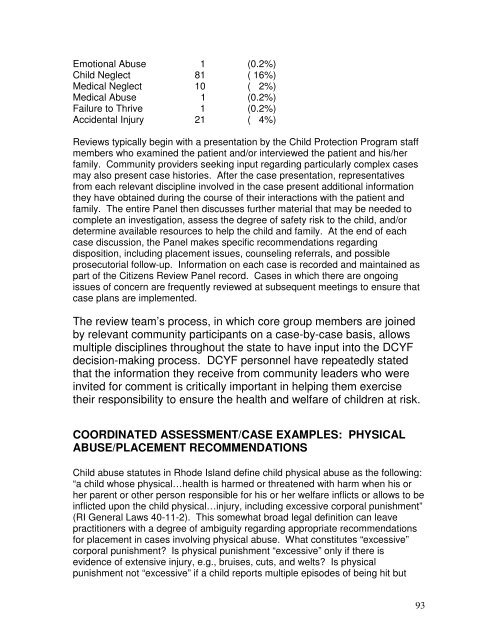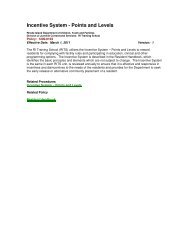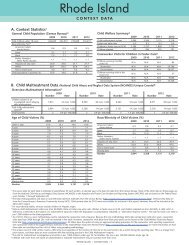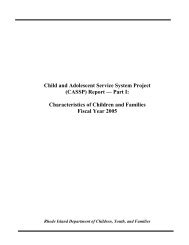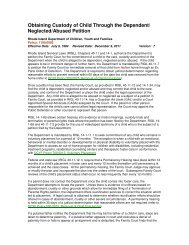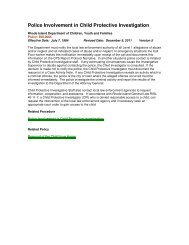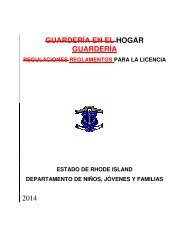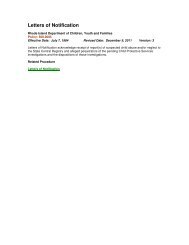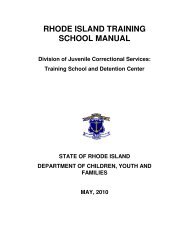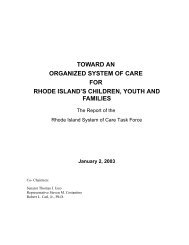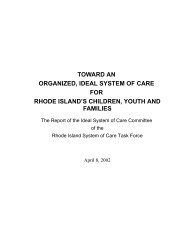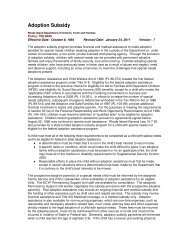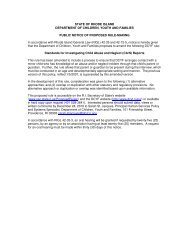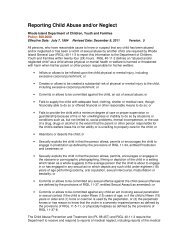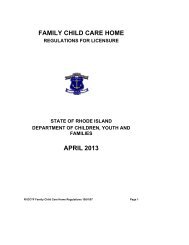CFSP 5 Year Plan - RI Department of Children, Youth & Families
CFSP 5 Year Plan - RI Department of Children, Youth & Families
CFSP 5 Year Plan - RI Department of Children, Youth & Families
You also want an ePaper? Increase the reach of your titles
YUMPU automatically turns print PDFs into web optimized ePapers that Google loves.
Emotional Abuse 1 (0.2%)<br />
Child Neglect 81 ( 16%)<br />
Medical Neglect 10 ( 2%)<br />
Medical Abuse 1 (0.2%)<br />
Failure to Thrive 1 (0.2%)<br />
Accidental Injury 21 ( 4%)<br />
Reviews typically begin with a presentation by the Child Protection Program staff<br />
members who examined the patient and/or interviewed the patient and his/her<br />
family. Community providers seeking input regarding particularly complex cases<br />
may also present case histories. After the case presentation, representatives<br />
from each relevant discipline involved in the case present additional information<br />
they have obtained during the course <strong>of</strong> their interactions with the patient and<br />
family. The entire Panel then discusses further material that may be needed to<br />
complete an investigation, assess the degree <strong>of</strong> safety risk to the child, and/or<br />
determine available resources to help the child and family. At the end <strong>of</strong> each<br />
case discussion, the Panel makes specific recommendations regarding<br />
disposition, including placement issues, counseling referrals, and possible<br />
prosecutorial follow-up. Information on each case is recorded and maintained as<br />
part <strong>of</strong> the Citizens Review Panel record. Cases in which there are ongoing<br />
issues <strong>of</strong> concern are frequently reviewed at subsequent meetings to ensure that<br />
case plans are implemented.<br />
The review team’s process, in which core group members are joined<br />
by relevant community participants on a case-by-case basis, allows<br />
multiple disciplines throughout the state to have input into the DCYF<br />
decision-making process. DCYF personnel have repeatedly stated<br />
that the information they receive from community leaders who were<br />
invited for comment is critically important in helping them exercise<br />
their responsibility to ensure the health and welfare <strong>of</strong> children at risk.<br />
COORDINATED ASSESSMENT/CASE EXAMPLES: PHYSICAL<br />
ABUSE/PLACEMENT RECOMMENDATIONS<br />
Child abuse statutes in Rhode Island define child physical abuse as the following:<br />
“a child whose physical…health is harmed or threatened with harm when his or<br />
her parent or other person responsible for his or her welfare inflicts or allows to be<br />
inflicted upon the child physical…injury, including excessive corporal punishment”<br />
(<strong>RI</strong> General Laws 40-11-2). This somewhat broad legal definition can leave<br />
practitioners with a degree <strong>of</strong> ambiguity regarding appropriate recommendations<br />
for placement in cases involving physical abuse. What constitutes “excessive”<br />
corporal punishment? Is physical punishment “excessive” only if there is<br />
evidence <strong>of</strong> extensive injury, e.g., bruises, cuts, and welts? Is physical<br />
punishment not “excessive” if a child reports multiple episodes <strong>of</strong> being hit but<br />
93


